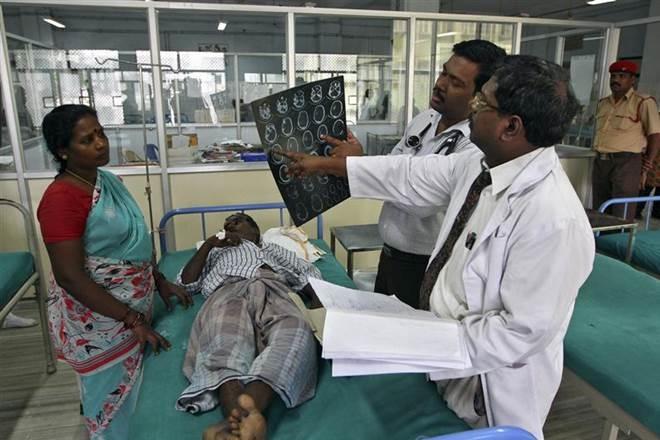Privatisation of Karnataka’s Health Sector: Karnataka to Sign an MoU With AB-NHPS

Image Used For Representation Purpose Only
In 2018, the former state government in Karnataka led by Siddaramaiah had announced Arogya Karnataka Yojane to ensure that primary, particular secondary and tertiary medications are accessible to each one in the state. Indu Bhushan, CEO of Ayushman Bharat-National Health Protection Scheme (AB-NHPS), speaking to The New Indian Express, noted that the Karnataka government is singing an MoU with the central government to implement the scheme. The AB-NHP – which was announced by the Finance Minister Arun Jaitley with the promise of an insurance coverage of Rs 5 lakh per family to about 10 crore of the poorest families in the union budegt – the health insurance scheme aims to provide insurance through both public and private hospitals.
Private hospitals in Karnataka are not happy with the cost borne by the central government for medical procedures under (AB-NHPS) of the central government. Association of Health Providers (India) (AHPI) is a lobby of the private hospitals. AHPI has been generating pressure on the central government to revise its costing; the current rates are the revised rates. The government had revised the rates following the criticism of the private hospitals.
Also Read: Who is Cheering for ‘Modicare’?
Now that Karnataka will be a beneficiary of the scheme AHPI, with the help of a faulty study, the private hospitals are demanding a hike in the costs of various hospital procedures. The ‘study’ labeled ‘Karnataka Government Costing Study’ is a chapter in the ‘Karnataka Public Health Policy’ that was published in November 2016 by the Karnataka Knowledge Commission or Karnataka Jnana Aayoga (KJA). The study examined prices for 20 common medical procedures and according to the findings, the private hospitals in Karnataka incur more cost in the medical procedures than what the government reimburses via the Central Government Health Scheme (CGHS).
The allocation made for the health sector in the state budget of Karnataka and the decision to sign the MoU with the AB-NHPS, which has the private hospitals at its centre, shows the path that the health sector in the state has embarked upon. The state, just like the central government, is privatising the health sector. The ruling Bharatiya Janata Party (BJP) government at the Centre plans to double the government expenditure on health from the existing 1.15% of the GDP to 2.5% by 2025, as per the National Health Policy 2017. The government, with such a “broad vision” in its annual budget for the fiscal year of 2018-2019, has allocated mere Rs 52,800 crore for health and it is just 5 per cent more than what was allocated for 2017-2018 which was Rs 50,079.6 crore. A Business Todayreport, however, says that to realise this dream of the NHP 2017 the central government health budget alone should increase at least 20 percent year-on-year for the next seven-eight years. Instead of investing more in public health, the government is giving away the responsibility for the private hospitals and insurance companies.
Also Read: Karnataka’s Expenditure on Education and Health is Shockingly Low
The relationship between the state government of Karnataka with the public health has been bad too. Out of Rs. 2 lakh crores (two trillion) – the total budget for the fiscal year 2017-2018, Rs. 7 lakh have been allocatedfor the sector, which amounts to 3.20 percent of the total budget. The allocation for the sector has slightly increased from 3.05 percent in the previous year’s budget, which was five lakh out of one lakh crore.
The data shows the decline in state’s expenditure on health since 2001. For the year 2000-2001, the allocation in the state budget was 5.1 per cent higher than the all-state average expenditure for Medical and Public Health, which was 4.6 per cent. One can see that the state’s allocation has usually been at par with the all-state average expenditure in the health sector. However, this has changed now. For the year 2016-2017, the all-state average expenditure was 4.9 percent and for the 2017-2018 and the state allocated 3.5 percent.
Also Read: Why is the Private Hospital Sector so Difficult to Regulate?
The government of Karnataka, in 2017, strived towards amending the Karnataka Private Medical Establishments (KPME) Act of 2007, standing against the schemes supporting the private health sector. The government’s move following this took a different turn, where in the reports have shown, the private players are having the upper hand in the health sector in the state. The decrease in the state’s expenditure on public health shows that the state's health sector is moving towards privatisation.
The Arogya Karnataka Yojane of the former government subsumed all the existing schemes in the state: Yeshaswini Scheme, Vajpayee Arogyashree Scheme, Rajiv Arogya Bhagya Scheme, Rashtriya Swasthaya Bima Yojana (RSBY) including RSBY for senior citizens, Rashtriya Bala Swasthaya Karyakram (RBSK), Mukhyamantri Santwana Harish Scheme and Indira Suraksha Yojane. This Universal Health Coverage for residents of Karnataka excluded the residents who have taken private health insurance policies on their own and those who were covered under Central Government Health Scheme of the Government of India.
The scheme aimed at providing a financial assistance up to Rs 30,000 per annum for specified complex secondary healthcare treatment to a family of up to five persons. In the event of the family requiring specified tertiary healthcare treatment, this annual limit would be increased to Rs.1.5 lakh per annum. For any family needing specified emergency tertiary healthcare treatment even after full utilisation of the annual limit, the additional assistance of Rs. 50,000 would be provided.
Also Read: The Neoliberal Model of Institutionalised Corruption
As argued in the case of the central government, the state government of Karnataka could have invested more in public health, and could have strengthened the existing programs. However, the state now has decided to be part of the scheme of the central government, which is a very rich invitation for the private hospitals and the insurance companies. This decision of the government is making the lobby of the private hospitals in the state stronger. The government of Karnataka allocating little for the Public Health in its annual budget, the government deciding to sign an MoU with the AB-NHPS, and at the same time the private hospitals in Karnataka writing letters to CEO of AB-NHPS, PMO, Health minister and NITI Aayog – threatening their withdrawal from the scheme is not a coincidence. In the letter AHPI has been flaunting, the KJA study has said, “The success of this ambitious scheme would largely depend on the active inclusive involvement of the private healthcare.”
Get the latest reports & analysis with people's perspective on Protests, movements & deep analytical videos, discussions of the current affairs in your Telegram app. Subscribe to NewsClick's Telegram channel & get Real-Time updates on stories, as they get published on our website.
























